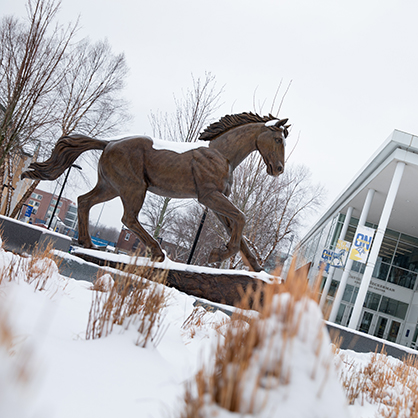
The Charger Blog
Charger Blogger Reflects on Importance of Starting Strong and Staying Consistent
Nutrition sciences major Beatrice Glaviano ’26 shares her tips for tackling the new semester with energy, grit, and plenty of peanut butter.
The Charger Blog
At the American Public Health Association Policy Action Institute in Washington, D.C., several Chargers networked with professionals and experts while deepening their knowledge of politics and public health.
July 12, 2022
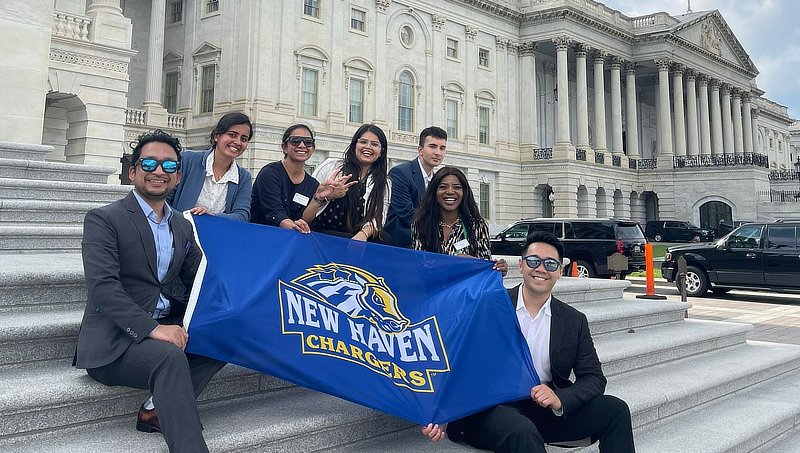
Six students in the University of New Haven’s School of Health Sciences recently traveled to Washington, D.C., to take part in the American Public Health Association (APHA) Policy Action Institute. It enabled more than 700 public health professionals, advocacy, experts, and students to connect in person and online.
The students, members of the University’s WeEmbody Lab Fellowship, had the opportunity to discuss pertinent public health topics, network, and heard from leaders in the field.
Alvin Tran, Sc.D., MPH, an assistant professor of public health and director of the WeEmbody Lab, accompanied the students to Washington.
“To be effective public health leaders, our students need to not only master the foundational knowledge of public health, but also be able to successfully navigate the political world to advocate for change,” he said. “The work of our emerging public health leaders should not end at research and practice. It needs to involve advocacy as well.
“Our students are learning to communicate with key decision makers at the state and federal levels,” he continued. “They aim to shape public policy to address critical public health topics, including gun violence and COVID-19.”
Below, the six fellows reflect on their experience at the conference.
Attending the American Public Health Association’s Policy Action Institute was part of the University of New Haven’s WeEmbody Lab training on health policy and advocacy.
The conference brought together public health professionals, students, advocacy experts, and leaders who discussed current issues in public health, interacted, and networked under the theme: Advancing Policy to Improve Health.
The speakers brought to the forefront the barriers associated with delivering public health services in an era of the coronavirus pandemic. Ashish Jha, White House COVID-19 response coordinator, stated that the pandemic requires a multifaceted response, and the federal government's core strategy in managing it has been through testing, vaccination, and treatment.
David A. Broniatowski, associate professor in the School of Engineering and Applied Science at George Washington University, also noted that amid the spread of anti-vaccine disinformation and misinformation, the pro-vaccine messages were not as well-crafted as they could be.
During the one-day conference, students used the opportunity to learn about the current issues, challenges, and strategies involved in public health policy advocacy. The one-on-one session with panelists on health policy advocacy helped students understand the career options in public health advocacy.
The American Public Health Association’s Policy Action Institute advocates for the importance of policymaking in public health. Many reputed personalities discussed the current public health concerns of the nation. They were on the stage sharing with us the possibilities for advancement and the need for action led by upcoming public health professionals.
As students, we are often confused about what to do after graduation and how to find our interests to specialize further within the field. All the panel discussions addressed many unanswered questions for students like us. There were also younger voices sharing their stories and the amazing work they are doing.
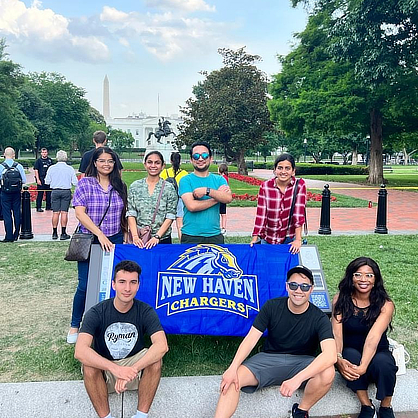
The two points I took away and would like to implement in my public health practice are the fact that public health is a very interesting profession. Public health workers should actively market jobs and interesting on-ground research opportunities to those aspiring to join the field. Understanding the various public health job opportunities that are present will help us pick the right one. For instance, I met a communication executive and coordinator at the seminar who worked for an NGO. I was unaware of such a position in public health. I would like to know more about it and explore the position further, as communication is one of my interests.
The second takeaway was the fact that public health doesn’t necessarily require more funding, but it requires more collaboration. These leaders provided insight and encouraged us to think about improving collaboration but not about raising funds. The American Public Health Association has enough strategies and plans that need to be implemented and monitored. Future students should be motivated to bridge the gaps with already established organizations and further build the field.
By the end of the seminar, I was completely motivated to serve society better. The seminar channeled my thinking and helped me get some clarity on what is expected of the coming generation.
I would highly recommend students to be part of the WeEmbody Research Lab at the University and to make the most of these amazing opportunities. I am grateful for the support of Professor Tran, who took us to the seminar and encouraged us to create networks.
The APHA’s Policy Action Institute in Washington, D.C., was an enriching experience. We had the opportunity to listen to influential leaders who practice public health in the real world.
On the first day of the trip, we traveled to Washington. After resting, we walked D.C., visiting the White House and the Washington Monument and having a lot of fun.
The second day was the main day, as it was the conference day. When I arrived at the venue, it seemed unbelievable, since I had never before seen such amazing speakers in person in the same room. The conference started with the speech of Anand Parekh, White House COVID-19 coordinator, who described the way the government is preparing for the next wave of COVID and gave insight on the planning of the government in mitigating the impact of the virus in the next wave. This was intense and an amazing start to the event.
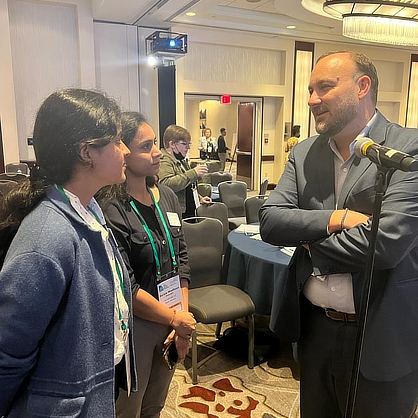
We had the opportunity to experience and listen to speakers working in different fields of public health addressing several vital issues. Speakers included the CDC executive director, epidemiologists, youth activists, executive director of APHA, CEO of de Beaumont Foundation, bipartisan policy makers, vice president of Planned Parenthood of America, and many more. Many important issues were raised, explained, and discussed, such as COVID-19, gun violence, and abortion.
One of my favorite inspirational speeches was by Dr. Brian C. Castrucci, CEO of de Beaumont Foundation. He said, “Community leaders can make more of a difference than a physician, and we should engage more people who do not understand the value of public health and make them understand it.”
Every panel discussion was followed by a question-and-answer session. I had the chance to ask an open question to a panel of great leaders, which was answered elaborately. The icing on the cake was when we got the chance to meet and interact with the speakers off the stage. The interaction opportunity helped us connect and network with the leaders and speakers. We discussed a few public health issues and asked questions, and there was also a book signing.
At the end of the day, we went to the Capitol and had the privilege of visiting the Dirksen Senate Office Building. On the last day, we all went and roamed around the famous parts of Washington, D.C., visited museums, and enjoyed ourselves.
Overall, this was a brilliant experience, and I wholeheartedly endorse it for those studying public health. This event was a real treat, a great opportunity for learning and networking, and it influenced me positively.
A special thanks to Dr. Alvin Tran who made this possible, mentored us remarkably, and was a huge source of support.
I am so lucky to have been selected as a WeEmbody Lab fellow through a very competitive process. Being a fellow itself is an enriching experience, and I feel it was a turning point in shaping my vision and perception regarding healthcare leadership as well as advocacy. I have come to realize that a solution to any pressing and critical issue is not possible without advocacy and a research-policy transformation.
I was so privileged to take part in a conference on “Advancing Policy to Improve Health” organized by the American Public Health Association’s (APHA) Policy Action Institute. This opportunity would not be possible if I were not selected for the WeEmbody Fellowship. This fellowship allowed me to not just attend the conference, but it also gave me a platform where I was able to interact with dynamic speakers from different backgrounds. It also gave me the confidence to speak up with a question in front of all attendees.
It was an awesome moment to listen to healthcare leaders ranging from Dr. Ashish Jha, the White House COVID-19 coordinator to Georges Benjamin, the executive director of the American Public Health Association.
A talk given by Dr. Brian Castrucci of the de Beaumont Foundation was particularly mesmerizing. I asked questions regarding the dissemination of evidence-based information to the panel of speakers. We also were able to hear from the Connecticut U.S. Senator Chris Murphy, who spoke virtually about ways to promote health equity and address critical issues.
Additionally, we had an amazing time as we were able to visit different attractions in Washington, D.C., such as the Washington Monument, the Capitol Building, and the Dirksen Senate Office Building.
One of the most rewarding experiences and the best part of the trip was being guided by Alvin Tran, Sc.D., MPH throughout our stay. He is not just a dynamic professor, but an awesome mentor and charismatic human being. He, too, is inspiring, and we are so lucky to have him as a mentor and as our leader. I am so grateful to him for his guidance, as well as for the opportunity and the lasting memories. I look forward to more opportunities in the future as well.
As a WeEmbody Lab fellow, I had the immense privilege of attending the APHA’s Action Policy Institute in Washington, D.C. It was a rare and rich experience to travel to a new place, interact with new people, try different foods, and admire the beauty of D.C. The trip was very replenishing, and I gained significant insights into advocacy and policy operations.
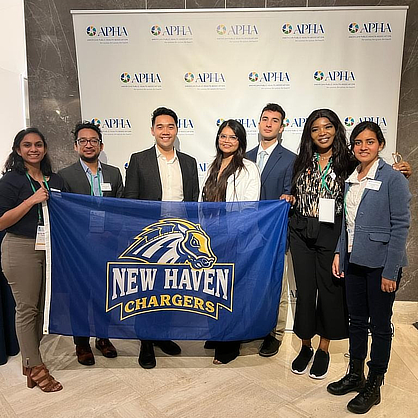
This conference gave me the privilege of observing the real world of policymaking. The White House COVID-19 coordinator, a policy reporter, and the CEO of the Center for Countering Digital Hate walked us through their experience during the COVID-19 crisis. They offered us a succinct description of the difficulties, the tools at hand, their way of thinking, and their strategic planning. It dawned on me very clearly what one policy can accomplish, especially at the moment of dire circumstances.
The conference kindled our passions by exposing the fault lines in the public health system. Inspiringly, the speakers urged the young aspirants to take up the fight for truth and facts on the front lines, as the COVID-19 crisis demonstrated that we were living in the nuclear age of information warfare. Additionally, it highlighted the significance of telling the truth, communicating productively, being transparent, and developing strong trust – lessons learned the hard way.
We had an array of youth advocates sharing their journey of enlightenment for their community's actual situation and how they are empowered to raise their voices for justice and equity. Their stories were heavy-laden with facts, pain, emotions, injustice, and suffering, all underscoring the urgent necessity for advocacy for new policy.
We interacted with the dignitaries from the panel who generously answered our questions and reflected on our comments and concerns. We had the chance to connect with other public health professionals and had meaningful conversations. This trip was highly enriching, and I thank Dr. Tran for taking this initiative and igniting our minds.
My experience during the American Public Health Association ‘s Policy Action Institute was a unique one, and it was one I needed for my own confirmation. Public health was a curve ball for me because I had abruptly switched career paths.
Coming from an engineering background, I knew this was going to be a change of pace. I knew so little about public health and the careers it offered, as well as the impact it had on so many people. The experience and knowledge I gained from this opportunity, along with the people I met, reaffirmed for me that this is the career path I want to pursue.
As the only undergraduate, I had less experience and knowledge in public health. Yet, I still felt welcomed. If I had the opportunity to tell more people about this fellowship, I would tell them it is 100 percent worth their time because of the experience and the people. This has changed my view of public health forever.
I have learned and developed new perspectives by listening to people’s stories from around the world. I have also created connections with people who have influenced others in a positive way, and I had the opportunity to learn from them.
May Ubeku ’23 MPH, Surya Madhavi Dinavahi ’23 MPH, Muskan Kohli ’23 MPH, Pradeep Rajbhandari ’23 MPH, Ruth Kameswara Rao ’23 MPH are candidates in the University’s Master of Public Health program. Neeko Rosete ’25 is a public health major at the University.
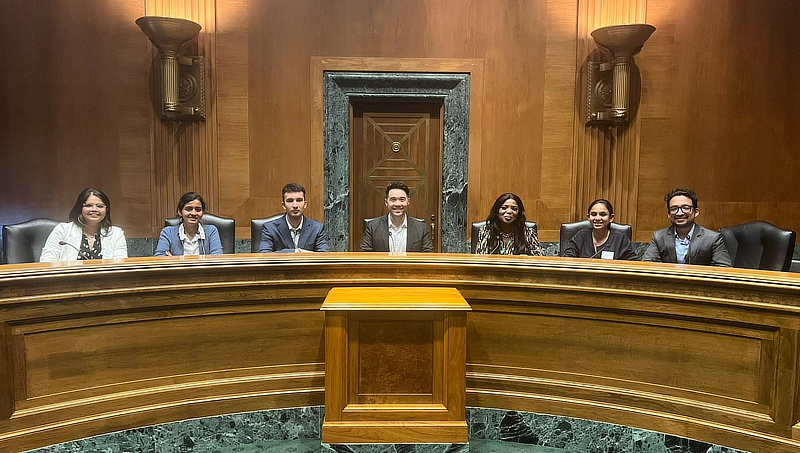

The Charger Blog
Nutrition sciences major Beatrice Glaviano ’26 shares her tips for tackling the new semester with energy, grit, and plenty of peanut butter.
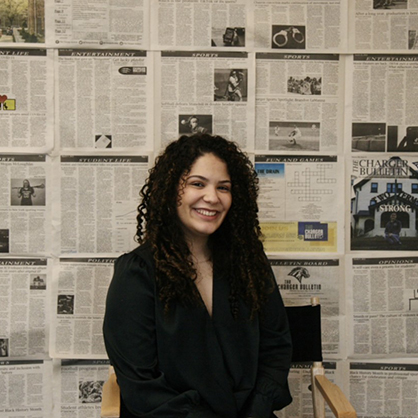
The Charger Blog
Amanda Castro ’22 shares how her time at the University of New Haven shaped her love for journalism, preparing her for a fast-paced role covering the 2024 election for Newsweek.
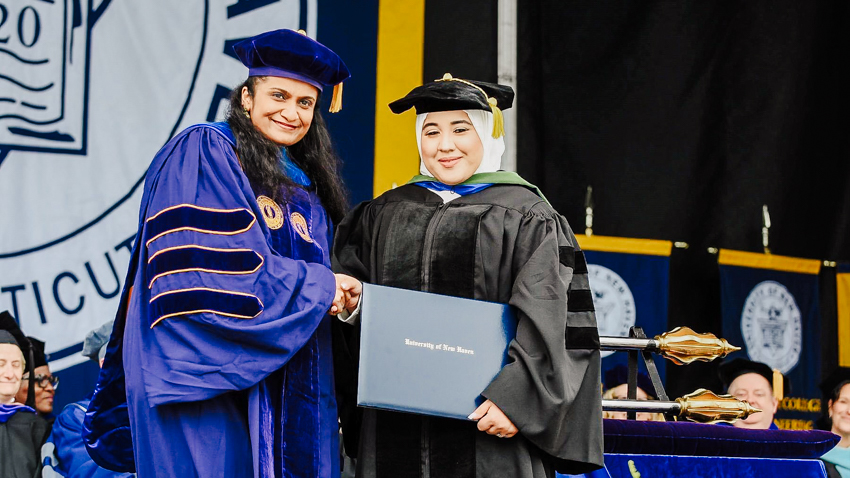
The Charger Blog
For the first time, theses written by recent graduates of the University of New Haven's Doctor of Health Sciences (DHSc) program, launched in 2021, have been published in the Journal of Healthcare Leadership (JHL), a highly respected peer-reviewed journal indexed in PubMed and the Web of Science.